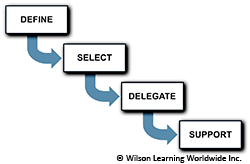Delegating with Confidence
Managers often spend time on tasks others could—and should—handle because they are reluctant to delegate tasks. They must overcome the tendency to adapt a "heroic" leadership approach and instead learn how to delegate responsibility appropriately. Failure to delegate leads to low morale, manager burnout, an unfulfilling work environment, and ultimately, low quality and productivity.
In Leading for Performance: Delegating with Confidence (LFP-DWC), managers explore the challenges of delegating and the conditions under which delegation is most effective. They learn a simple, proven delegation process and related skills and tools. They learn to effectively entrust others with tasks, while maintaining ultimate responsibility for the outcome.
Programme Outcomes
Leading for Performance: Delegating with Confidence enables leaders to delegate the right tasks with the right level of responsibility to the right associate. This maximises the opportunities for involvement, fulfilment, productivity and success of the organisation and its people.
Approach
Leading for Performance: Delegating with Confidence is a half-day instructor-led module that can be facilitated by Wilson Learning or by a leader-trained in-house professional.
This enables:
- Face-to-face interaction among participants and with the facilitator
- True-to-life skills practice with immediate in-person feedback
- The opportunity for real-time commitment to action
Enabling Improved Performance
Leading for Performance: Delegating with Confidence features a Delegation Planner and Job Aid Card so participants can fine-tune and apply their newly acquired skills and behaviours on the job. Involving managers and training them to coach is important for successful implementation.
Measurement and Evaluation
Organisations that implement Leading for Performance: Delegating with Confidence have access to a broad range of tools to measure initial behavioural changes and business results. For LFP-DWC, one approach may be a web-based survey of participants' direct reports to identify the degree of change and the differences this change makes.
To learn more about measuring the impact of learning, visit Measurement and Evaluation Services.



 Please complete this form to download the factsheet for Delegating with Confidence.
Please complete this form to download the factsheet for Delegating with Confidence.



